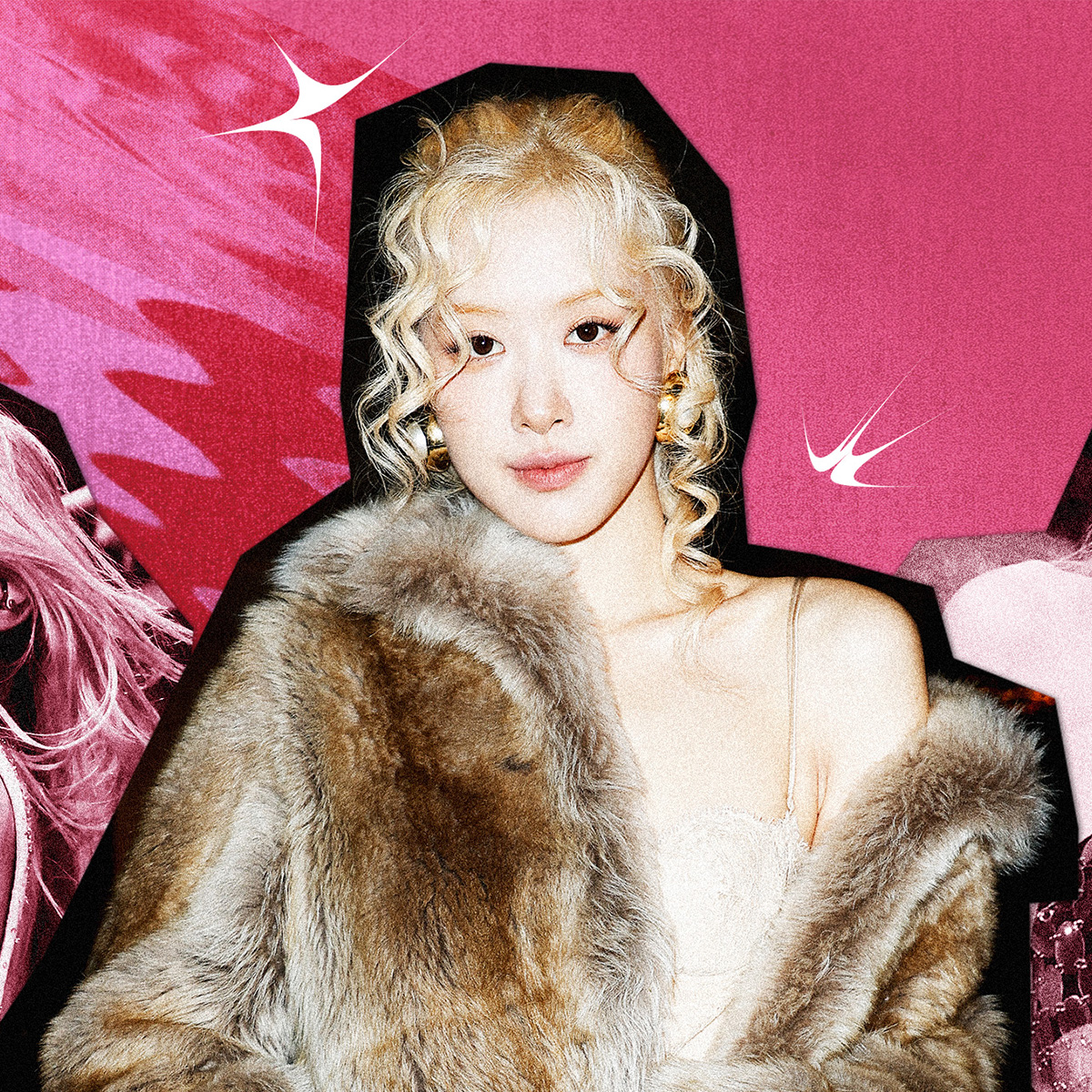
The Western music industry has a habit of underestimating K-pop, but ROSÉ isn't letting them. After years of Korean music still being treated like a niche genre in the U.S., the singer’s debut album rosie proves that emotional vulnerability is the key to undeniable crossover success.
ROSÉ walked a long path toward her first full-length solo album, which finally arrived on December 6, 2024 (via Atlantic Records/THEBLACKLABEL). The 27-year-old—whose real name is Roseanne Park or Park Chae-young—was born in New Zealand and grew up in Australia until the age of 15, when she moved to South Korea to train as an idol under YG Entertainment. In 2016, she debuted as a member of BLACKPINK, and they immediately set off on a meteoric rise to become one of the world’s biggest girl groups, selling out stadiums for their “Born Pink” world tour and headlining Coachella in 2023. But when YG announced in December 2023 that all four members—also including JISOO, JENNIE, and LISA—were not renewing their solo contracts with the company, it became clear that they were setting out in new directions as individual artists (while the label would still manage future BLACKPINK activities).
From the moment of the announcement, all eyes were on how each idol would steer their own careers out from under the crafted BLACKPINK brand. JENNIE announced her label and agency ODDATELIER within a month of YG’s announcement, followed by LISA’s LLOUD and JISOO’s BLISSOO the following February. In June 2024, ROSÉ finally gave an update on Instagram confirming that she had music soon to come, coupling a sentimental caption—which started with the phrase, “Sorry for the long wait”—with photos of a recording studio session in which she’s dressed in a Bruno Mars T-shirt.

After nearly a year where BLACKPINK’s fandom BLINKS (and casual listeners like myself) were left questioning, ROSÉ gave a thundering answer. On October 17, she released “APT.,” a boisterous, pop-punk duet with Bruno Mars celebrating good times spent drinking with friends. With minimal promotion—beyond a day-before announcement and some cheeky Instagram teases—the party track quickly took over TikTok and radio play, eventually peaking at no. 8 on the Billboard Hot 100 and claiming no. 1 on the Billboard Global 200 for seven weeks and counting.
It was the perfect song to introduce ROSÉ as an artist melding Western pop and K-pop origins. Even though most of the song’s lyrics are in English and the carefree theme is universal, “APT.” is distinctly Korean in its influences. It takes both its name and its post-chorus from the classic Korean drinking game 아파트 (pronounced "apateu"). In her cover interview with Paper Magazine, ROSÉ credited her single’s popularity partly to global interest in Korean culture. “Korean culture is, I would say, one of the most fun cultures out there. To be able to show that to the world, it's like a personal excitement for me,” she told the outlet.
Her excitement has infected the world. In the months following “APT.”s release, the TikTok hashtag #apt racked up over 570 million posts. Among the hashtags “#aptgame” or “#aptdrinkinggame” clips of people around the world playing the drinking game have gotten thousands or sometimes millions of likes. It’s become a cultural phenomenon, like the ubiquity of dalgona candy challenges following the release of Squid Game.

Of course, U.S. music fans becoming obsessed with Korean songs and culture is nothing new; before “APT.” and Squid Game, there was Parasite’s Best Picture win at the 2020 Oscars, BTS’ 2020 chart-topper “Dynamite,” and the virality of “Gangnam Style” in 2012. Odds are that every music listener in the U.S. has heard a song by a K-pop artist at least once, thanks to the recent influx of English releases like BTS’s “Dynamite” and “Butter,” or TWICE’s “The Feels.” K-pop groups singing in English isn’t a new practice; long before Western artists collaborated regularly with Korean idols (or singers who trained and debuted under a regimented entertainment company) K-pop groups would use English phrases even in the industry’s earliest songs. The appearance of K-pop songs on U.S. charts also isn’t anything new; back in 2009, Wonder Girls became the first group to break onto the Billboard Hot 100 chart with their retro hit “Nobody,” which was the same year that BoA’s self-titled English-language album hit No. 1 on the Billboard 200. Still, many idol groups’ English-language releases have struggled to reach the mainstream heights that ROSÉ achieved on her first try.
K-pop fans have spent the past few years debating the line between the Western genre distinctions of “K-pop” and “pop,” while pointing out that streamers like Spotify and Apple Music tend to lump any release by an idol singer under K-pop even when the song is a completely different genre. The answer seems to lie within the cultural differences between how Korean fan culture and American fan culture praise singers. In Korea, idols are held to extremely high standards to maintain a “pure” image; their career could end over scandals like being caught dating, using illicit substances, or sharing their political opinions. Not only are these actions seen as fair game for Western singers, but they’re in many ways as expected of pop stars as writing their own lyrics, as a huge part of fan identification comes from the artists’ level of authenticity. When K-pop idols are treated like living dolls and Western pop stars can’t be anything less than full transparency, where can an aspiring crossover act find a middle ground?
rosie proves that the answer lies in the music. The record is an intensely personal album; over 12 tracks, ROSÉ lays her insecurities and troubles bare, as she examines a rollercoaster of emotions spurred by toxicity. Though “APT.” is an alt-rock banger, much of rosie features minimal, acoustic-tinged production, with each track being both skillfully catchy and admiringly vulnerable; it’s impossible not to compare the songwriting style to the likes of Taylor Swift and Olivia Rodrigo. With songs like “number one girl,” she plays with duality, nodding toward unhealthy relationships with both an on-again-off-again lover and her millions of loving yet demanding fans. During her press run for rosie, the singer has been vocal about mining her 20s for inspiration and crafting an intensely personal project, telling i-D that her “mission statement” for the album was “always just to try and approach it with as much honesty as humanly possible.”
When K-pop idols are treated like living dolls and Western pop stars can’t be anything less than full transparency, where can an aspiring crossover act find a middle ground?
Such complete transparency is as mesmerizing as it is refreshing. In the run-up to rosie’s debut, the singer gave multiple interviews revealing the writing process behind her album, which was crafted over several months of songwriting sessions in L.A. K-pop interviews usually straddle a fine line between offering insights on an idol’s latest release and making sure that none of the soundbites threaten their pure, neutral image. Awkward clips where idols try to avoid describing songs about sex or lust have become infamous memes within the wider fandom. But in her press run, ROSÉ has been open about her songs being directly inspired by her relationship history, and even occasionally reminisced about going through heartbreak while promoting with BLACKPINK. Instead of handling dating like the taboo it is in the K-pop industry, she treats the self-admission that she’s “very serious about dating” as the ordinary fact it should be, rather than a jaw-dropping admission from an idol at the top of her career. In an interview with The New York Times, she acknowledges that her candidness isn’t normal, and makes a very clear statement about her personal life: “I do want to make sure that that’s very well addressed: The fact that it’s not about the story of who Rosie has been with or whatever. It’s really more about the art.”
In today’s fandom culture, both Western and Eastern, chart impact is held as the ultimate mark of success. While rosie has had a strong start—her music video “toxic til the end,” which she dropped alongside the album, has gotten 35 million views in just five days—ROSÉ has solidified her debut as one of K-pop’s most important albums in recent years purely through the inspiration it gives for the industry’s future. Even in her BLACKPINK days, ROSÉ was a trailblazer as part of the unabashedly cool, unapologetic message of the group’s music, that she was one of those confident girls who could do “what I want with what I like.” Now, by stepping out from behind that persona and sharing her most intimate stories on rosie, ROSÉ is connecting with fans all around the globe and seeding a future for K-pop idols where they can make a global impact by speaking on the topics and passions that lie in their hearts. At a time when the K-pop industry is constantly searching for growth in the U.S., she exemplifies that authenticity is a way to become a force in American culture.







